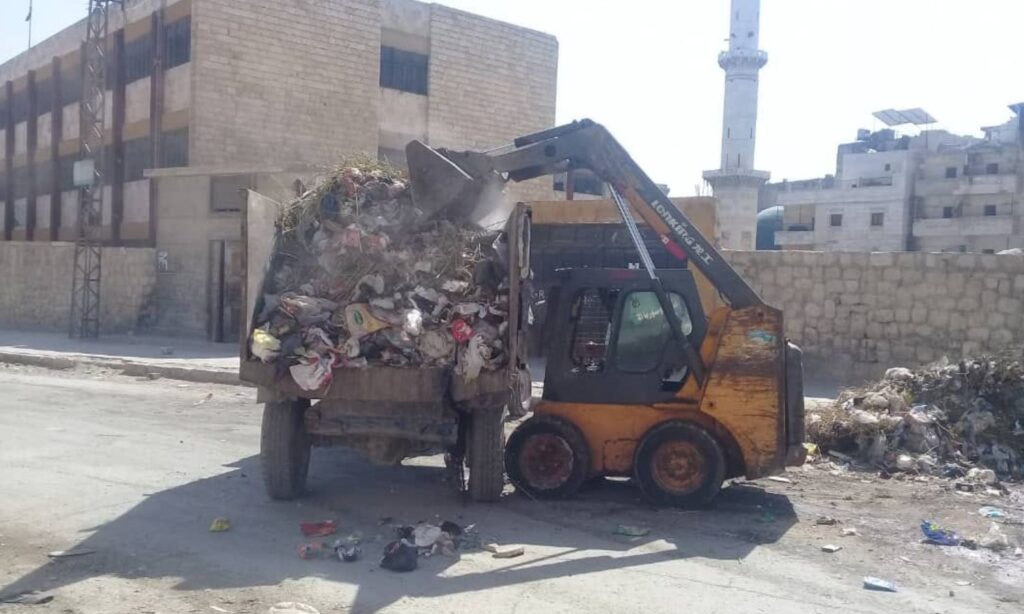Aleppo – Mohammed Ali
Piles of garbage are spread across several streets and neighborhoods in the city of Aleppo, with not enough containers or effective methods for collection, despite the serious health risks posed by their random presence.
The neglect of cleanliness is evident in several neighborhoods such as Salah al-Din, al-A’zamiya, al-Mashhad, and al-Kalasa, where piles of garbage remain strewn in the streets without any action taken for collection and removal by the city council, which has often promoted its cleanup campaigns during events like “Environment Day” whenever a minister or official from the capital is present.
No waste collectors
According to an employee from within the municipal palace in Aleppo, there is a “huge shortage” of waste collectors in the city due to several factors, the most prominent being low salaries and wages, lack of protective equipment, and even work tools, along with overburdening them with workloads exceeding their capacities.
For instance, only seven workers actually operate in the entire al-Jadida sector in Aleppo, and only two employees work during the evening to service the entire al-Jamiliya area in downtown Aleppo, despite the difficulty of the task due to the vastness of the area and the presence of commercial shops and vegetable and fruit stalls, along with the waste they leave after the market closes.
The same applies to the al-Hal market in the al-Masharqa neighborhood, which was opened by the governorate to assemble shops and stalls for fruits and vegetables, but they neglected to provide it with enough cleaning workers and the necessary machinery to service it and collect the accumulated waste throughout the day.
The scenario repeats with the transfer of the al-Hal market four years ago from the al-Hamdaniya neighborhood to the al-Amiriya area, which is lacking in services, notably cleanliness services.
According to the employee who requested anonymity, another problem arises regarding cleaning workers, which is that most of them are getting older and cannot bear the workload, while the younger generation is absent due to low wages and other factors such as the inability of those required for compulsory and reserve service to apply for government jobs to avoid being conscripted.
The monthly salary for cleaning workers, including the nature of the work, does not exceed 400,000 to 500,000 Syrian pounds, which is less than 10% of the minimum living standard, according to the World Food Programme, which is 2.75 million Syrian pounds (about 188 USD).
Abdul Razzak Habzeh, Secretary of the Consumer Protection Association in Damascus, said that the total number of Syrian citizens of low income constitutes about 85% of the population.
He added that the monthly income of an employee is about 350,000 pounds (equivalent to about 25 USD), which is less than 10% of the monthly expenses for a working citizen, according to what he shared with the government Tishreen newspaper.
He noted that the cost of breakfast and lunch for a family of five is estimated at no less than 200,000 pounds daily, at a minimum, meaning that the family effectively needs about seven million Syrian pounds monthly.
According to the employee in the municipal palace, there is also a shortage of functioning machinery for garbage collection, due to damage to some during the years of war, the failure to repair malfunctioning machines, and the lack of importing new machinery. Additionally, the functioning machines suffer from a fuel shortage that affects their operation, while piles of garbage accumulate in containers awaiting collection.
A precious treasure for scavengers
Large piles of garbage have become a valuable treasure for scavengers, amid worsening economic and living conditions, with 16.7 million people in Syria in need of humanitarian aid, according to the United Nations.
Salah (42 years old), a resident of Salah al-Din, mentioned that the neighborhood witnesses continuous rounds of scavengers morning and evening on the garbage piles to empty them of plastics, glass, and other materials.
He said that the scavengers randomly empty the contents of the garbage bags, making it more difficult to collect them later, so they are left as they are, while their foul odors spread among the residential neighborhoods, amid neglect that is believed to be intentional by the concerned authorities, because the area is “classified as a poor neighborhood that no one cares about.”
The spread of garbage piles leads to health hazards and respiratory diseases for the residents in the long term, along with the spread of insects and rodents in many areas neglected in terms of cleanliness.
The cleanliness crisis in the city is not new; it has persisted for several years without any entity addressing its resolution, despite being a fundamental aspect of life, not a luxury that can be dispensed with.
With the Syrian situation becoming increasingly grim and complex over the past 13 years, the problem of garbage spread has intensified, especially since solid waste management was an acknowledged environmental issue in Syria prior to 2011. The handling of waste was inadequate and lacked regulatory oversight on emissions impacting the environment, while the environmental governance system was weak, according to a report by the Dutch PAX organization.

